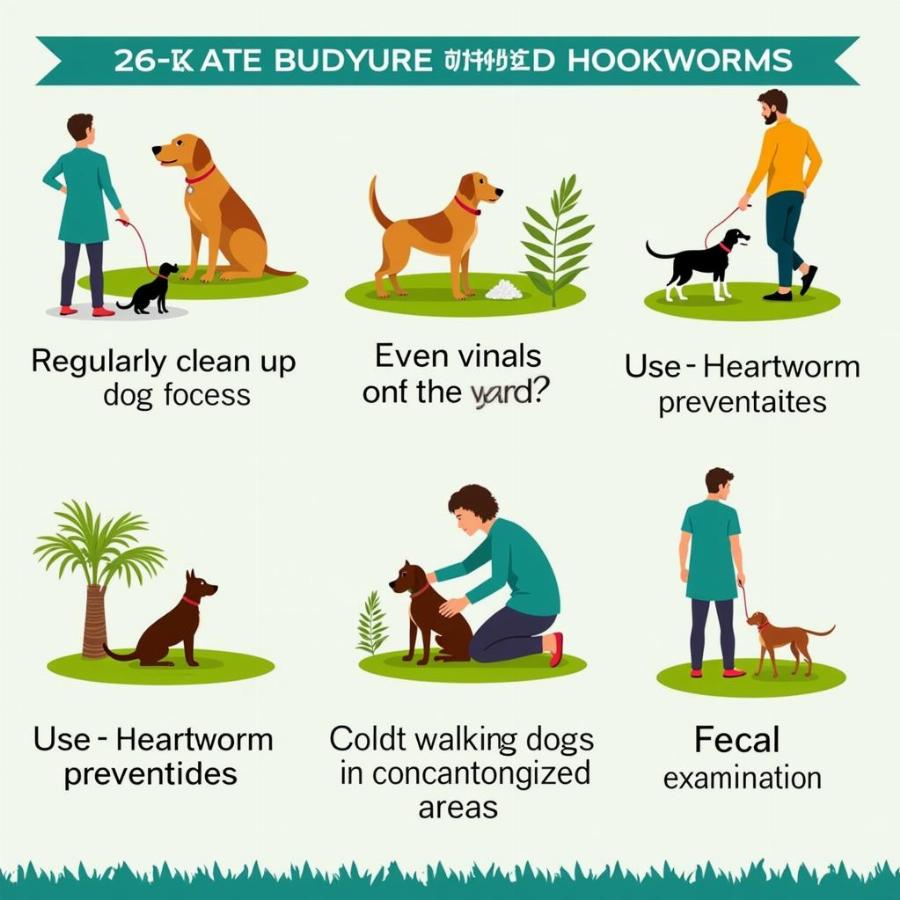Hookworms in dogs are a serious concern for pet owners. These tiny parasites latch onto your dog’s intestinal wall and feed on their blood, leading to a range of health problems. Understanding how dogs contract hookworms, recognizing the symptoms, and knowing how to treat and prevent them is crucial for responsible dog ownership. This guide will provide you with all the essential information you need to protect your furry friend from these dangerous parasites.
Understanding Hookworms in Dogs
Hookworms are intestinal parasites that affect dogs of all ages and breeds. They thrive in warm, moist environments and can be found in contaminated soil, feces, and even on the fur of infected animals. These parasites are particularly dangerous for puppies and young dogs, as they can cause severe anemia and even death if left untreated. Adult dogs can also suffer significant health consequences, including weakness, weight loss, and digestive issues. Understanding how dogs get hookworms is the first step in preventing infestation. Dogs can become infected by ingesting hookworm larvae, through skin contact with contaminated soil, or even through their mother’s milk.
Recognizing Hookworm Symptoms in Dogs
Recognizing the signs of hookworms in your dog is vital for early diagnosis and treatment. Some common hookworm symptoms dogs exhibit include pale gums, lethargy, coughing, diarrhea, and bloody stool. If your dog displays any of these symptoms, it is crucial to consult a veterinarian immediately. Early diagnosis and treatment can significantly improve your dog’s prognosis and prevent long-term health complications. Hookworms in dogs can cause a significant amount of blood loss, leading to anemia, which can be life-threatening, especially in puppies.
How Do You Treat Hookworms in Dogs?
Thankfully, hookworm disease in dogs is treatable. Your veterinarian will typically diagnose the infection through a fecal examination. Treatment usually involves deworming medications administered orally or through injection. The specific medication and dosage will depend on the severity of the infection and your dog’s overall health. It’s essential to follow your veterinarian’s instructions carefully and complete the entire course of treatment, even if your dog’s symptoms improve. This helps ensure that all the hookworms are eliminated and prevents reinfection. How do you treat hookworms in dogs effectively? Consistent veterinary care and adherence to the prescribed treatment plan are key to successful recovery.
Preventing Hookworm Infection in Your Dog
Preventing hookworm infection is the best way to protect your dog from these harmful parasites. Regular fecal examinations are crucial for early detection and treatment. Keeping your yard clean and free of dog feces can significantly reduce the risk of contamination. You should also avoid walking your dog in areas known to be contaminated with hookworm larvae. Additionally, some heartworm preventatives also offer protection against hookworms, so talk to your vet about incorporating these into your dog’s preventative care routine.
 Preventing Hookworm Infection in Dogs
Preventing Hookworm Infection in Dogs
How Does a Dog Get Hookworm? Various Routes of Infection
Hookworm transmission occurs through several routes, including ingestion, skin penetration, and even transmammary transmission from mother to puppy. This makes understanding how does a dog get hookworm so important. Puppies are especially vulnerable due to their developing immune systems. Therefore, ensuring a clean environment and regular deworming are essential for their health and well-being. Avoiding areas where other dogs frequently defecate can also help minimize the risk of infection.
Conclusion
Hookworms in dogs are a serious health concern, but with proper understanding, diagnosis, and preventative measures, you can protect your beloved companion from these parasites. Regular veterinary check-ups, maintaining a clean environment, and prompt treatment are essential for ensuring your dog’s long-term health and happiness. Don’t hesitate to contact your vet if you suspect your dog may have hookworms. Early intervention is key to a successful recovery.
FAQ
-
What are the first signs of hookworms in dogs? Pale gums, lethargy, and diarrhea are often the earliest signs.
-
Can humans get hookworms from dogs? Yes, although rare, a type of hookworm can infect humans through skin contact with contaminated soil.
-
How often should I deworm my dog for hookworms? Consult your veterinarian for a personalized deworming schedule.
-
Are there any home remedies for hookworms in dogs? No, it’s essential to seek professional veterinary care for diagnosis and treatment.
-
Can hookworms be fatal in dogs? Yes, particularly in puppies and young dogs, severe anemia caused by hookworms can be life-threatening.
-
How can I tell if my dog has hookworms or roundworms? A fecal exam by a veterinarian is the only way to definitively diagnose the type of intestinal parasite.
-
How long does it take to get rid of hookworms in dogs? Treatment typically takes several weeks, and follow-up fecal exams are necessary to ensure complete eradication.
More Questions and Related Articles
For more information on hookworm disease in dogs, hookworm symptoms dogs, how do you treat hookworms in dogs, and how does a dog get hookworm, please explore our other helpful resources available on our website. We also have articles on hookworms in dogs.
Beaut Dogs is your go-to resource for all things dog-related. We offer comprehensive guides on various aspects of dog ownership, from breed information to health and wellness. When you need support, please contact us via Email: [email protected], and Beaut Dogs will provide detailed and accurate answers. Visit us at https://beautdogs.com today!